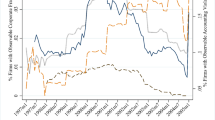Abstract
Prediction markets are a form of group decision support system which uses a market mechanism to elicit and aggregate information from large numbers of individuals. The literature recognises their potential as decision support tools, but also notes several issues of concern regarding their utility in an organisational setting. One critical concern is the possibility that prediction markets may be subject to malicious manipulation. This paper presents a field experiment which examines the effect of such manipulations on prediction market performance. We divide a sample of 72 contracts into a control group and an experimental group. Contracts in the experimental group are manipulated by a trader with a malicious motivation. The study demonstrates that manipulations do have an effect on prediction market accuracy, but that these effects are rapidly ameliorated by rational traders and shows that fear of malicious manipulation should not preclude the use of prediction markets as organisational decision making tools.






Similar content being viewed by others
References
Abramowicz, M. (1999). The Law and Markets Movement. The American University Law Review, 49, 327–431.
Berg, H., & Proebsting, T. A. (2009). Hanson’s Automated Market Maker. The Journal of Prediction Markets, 3(1), 45–59.
Berg, J. E., & Rietz, T. A. (2003). Prediction Markets as Decision Support Systems. Information Systems Frontiers, 5(1), 79–93.
Berg, J. E., & Rietz, T. A. (2006). The Iowa Electronic Markets: Stylized Facts and Open Issues. In R. W. Hahn, & P. C. Tetlock (Eds.), Information Markets: A New Way of Making Decisions (pp. 142–169). Washington D.C: AEI-Brookings Joint Center for Regulatory Studies.
Chen, K.-Y., Fine, L. R., & Huberman, B. A. (2003). Predicting the Future. Information Systems Frontiers, 5(1), 47–61.
Chen, Y., et al. (2010). Gaming Prediction Markets: Equilibrium Strategies with a Market Maker. Algorithmica, 58(4), 930–969.
Deck, C. & Porter, D., 2013. Prediction Markets in the Laboratory. Journal of Economic Surveys, p.n/a–n/a.
Deck, C., Lin, S., & Porter, D. (2013). Affecting policy by manipulating prediction markets: Experimental evidence. Journal of Economic Behavior & Organization, 85, 48–62.
Ellis, D. G., & Fisher, B. A. (1994). Small Group Decision Making: Communication and the Group Process (4th ed., ). New York: McGraw-Hill Book Company.
Fama, E. F. (1970). Efficient Capital Markets: A Review of Theory and Empirical Work. Journal of Finance, 25(2), 383–417.
Graefe, A., & Weinhardt, C. (2008). Long-Term Forecasting with Prediction Markets A Field Experiment on Applicability and Expert Confidence. The Journal of Prediction Markets, 2(2), 71–91.
Gruca, T. S., & Berg, J. E. (2007). Public Information Bias and Prediction Market Accuracy. The Journal of Prediction Markets, 1(3), 219–231.
Gruca, T. S., Berg, J. E., & Cipriano, M. (2005). Consensus and Differences of Opinion in Electronic Prediction Markets. Electronic Markets, 15(1), 13.
Gruca, T. S., Berg, J. E., & Cipriano, M. (2008). Incentive and Accuracy Issues in Movie Prediction Markets. The Journal of Prediction Markets, 2(1), 29–43.
Guo, Z., Fang, F., & Whinston, A. B. (2006). Supply chain information sharing in a macro prediction market. Decision Support Systems, 42(3), 1944–1958.
Hahn, R. W., & Tetlock, P. C. (2006a). A New Tool for Promoting Economic Development. In R. W. Hahn & P. C. Tetlock, eds. Information Markets: A New Way of Making Decisions (pp. 170–194). Washington D.C:: AEI-Brookings Joint Center for Regulatory Studies.
Hahn, R.W. & Tetlock, P.C., 2006b. Information Markets: A New Way of Making Decisions, Washington D.C: AEI-Brookings Joint Center for Regulatory Studies.
Hahn, R. W., & Tetlock, P. C. (2006c). Introduction to Information Markets. In Information Markets: A New Way of Making Decisions (pp. 1–12). Washington D.C: AEI-Brookings Joint Center for Regulatory Studies.
Hall, C. (2010). Prediction Markets: Issues and Applications. The Journal of Prediction Markets, 4(1), 27–58.
Hanson, R., 2006. Foul Play in Information Markets. In Information Markets: A New Way of Making Decisions. Washington D.C: AEI-Brookings Joint Center for Regulatory Studies, pp. 126–141.
Hanson, R. (2007a). Logarithmic Market Scoring Rules for Modular Combinatorial Information Aggregation. The Journal of Prediction Markets, 1(1), 3–15.
Hanson, R. (2007b). The Policy Analysis Market (A Thwarted Experiment in the Use of Prediction Markets for Public Policy). Innovations: Technology, Governance, Globalization, 2(3), 73–88.
Hanson, R., Oprea, R., & Porter, D. (2006). Information aggregation and manipulation in an experimental market. Journal of Economic Behavior & Organization, 60(4), 449–459.
Hayek, F. A. (1945). The Use of Knowledge In Society. American Economic Review, 35(4), 519–530.
Ho, T.-H., & Chen, K.-Y. (2007). New Product Blockbusters: The Magic and Science of Prediction Markets. California Management Review, 50(1), 144–158.
Hopman, J. (2007). Using Forecasting Markets to Manage Demand Risk. Intel Technology Journal, 11(2), 127–136.
Jacobsen, B., et al. (2000). (In)accuracy of a European political stock market: The influence of common value structures. European Economic Review, 44(2), 205–230.
Jian, L., & Sami, R. (2012). Aggregation and Manipulation in Prediction Markets: Effects of Trading Mechanism and Information Distribution. Management Science, 58(1), 123–140.
Kamp, G., & Koen, P. A. (2009). Improving the Idea Screening Process within Organizations using Prediction Markets: A Theoretical Perspective. The Journal of Prediction Markets, 3(2), 39–64.
Kolb, R. (1997). Understanding futures markets (5th ed., ). Malden MA: Blackwell Publishers.
LaComb, C.A., Barnett, J.A. & Pan, Q., 2007. The Imagination Market. Information Systems Frontiers, 9(2–3), pp. 245–256.
Ledyard, J., 2006. Designing Information Markets for Policy Analysis. In Information Markets: A New Way of Making Decisions. Washington D.C: AEI-Brookings Joint Center for Regulatory Studies, pp. 37–66.
Luckner, S., & Weinhardt, C. (2007). How to Pay Traders in Information Markets: Results from a Field Experiment. The Journal of Prediction Markets, 1(2), 147–156.
Malkiel, B. G. (2003). The Efficient Market Hypothesis and Its Critics. Journal of Economic Perspectives, 17(1), 59–82.
Malkiel, B. G. (2005). Reflections on the Efficient Market Hypothesis: 30 Years Later. The Financial Review, 40(1), 1–9.
Oliven, K., & Rietz, T. A. (2004). Suckers Are Born but Markets Are Made: Individual Rationality, Arbitrage, and Market Efficiency on an Electronic Futures Market. Management Science, 50(3), 336–351.
Oprea, R., et al. (2008). Can Manipulators Mislead Prediction Market Observers? Economic Science Institute: Chapman University Available at: http://ideas.repec.org/p/chu/wpaper/08-01.html [Accessed March 28, 2013].
Ortner, G. (1997). Forecasting Markets - An Industrial Application. Technical University of Vienna.
Plott, C. R., & Chen, K.-Y. (2002). Information Aggregation Mechanisms: Concept. Design and Implementation for a Sales Forecasting Problem. Pasadena, CA.
Polgreen, P. M., Nelson, F., & Neumann, G. (2006). Using Prediction Markets to Forecast Trends in Infectious Diseases. Microbe, 1(10), 459–465.
Rajakovich, D., & Vladimirov, V. (2009). Prediction Markets as a Medical Forecasting Tool: Demand for Hospital Services. The Journal of Prediction Markets, 3(2), 78–106.
Remidez, H. & Joslin, C., 2007. Using Prediction Markets to Support IT Project Management - Research in Progress. In International Research Workshop on IT Project Management 2007. Montreal, Quebec, Canada: Association for Information Systems.
Rhode, P.W. & Strumpf, K.S., 2008. Historical Political Futures Markets: An International Perspective.
Servan-Schreiber, E., et al. (2004). Prediction Markets: Does Money Matter? Electronic Markets, 14(3), 243–251.
Slamka, C., Skiera, B., & Spann, M. (2013). Prediction Market Performance and Market Liquidity: A Comparison of Automated Market Makers. IEEE Transactions on Engineering Management, 60(1), 169–185.
Spann, M., & Skiera, B. (2003). Internet-Based Virtual Stock Markets for Business Forecasting. Management Science, 49(10), 1310–1326.
Sunstein, C. R. (2006). Deliberating Groups vs. Prediction Markets (or Hayek’s Challenge to Habermas). Episteme: A Journal of Social Epistemology, 3(3), 192–213.
Tziralis, G., & Tatsiopoulos, I. (2007). Prediction Markets: An Extended Literature Review. The Journal of Prediction Markets, 1(1), 75–91.
Van Bruggen, G. H., et al. (2010). Prediction Markets as institutional forecasting support systems. Decision Support Systems, 49(4), 404–416.
Waitz, M., & Mild, A. (2009). Improving Forecasting Accuracy in Corporate Prediction Markets A Case Study in the Austrian Mobile Communication Industry. The Journal of Prediction Markets, 3(3), 49–62.
Wolfers, J., & Zitzewitz, E. (2004). Prediction markets. The Journal of Economic Perspectives, 18(2), 107–126.
Wolfers, J. & Zitzewitz, E., 2006. Five Open Questions About Prediction Markets. In Information Markets: A New Way of Making Decisions. Washington D.C: AEI-Brookings Joint Center for Regulatory Studies, pp. 13–36.
Author information
Authors and Affiliations
Corresponding author
Rights and permissions
About this article
Cite this article
Buckley, P., O’Brien, F. The effect of malicious manipulations on prediction market accuracy. Inf Syst Front 19, 611–623 (2017). https://doi.org/10.1007/s10796-015-9617-7
Published:
Issue Date:
DOI: https://doi.org/10.1007/s10796-015-9617-7



